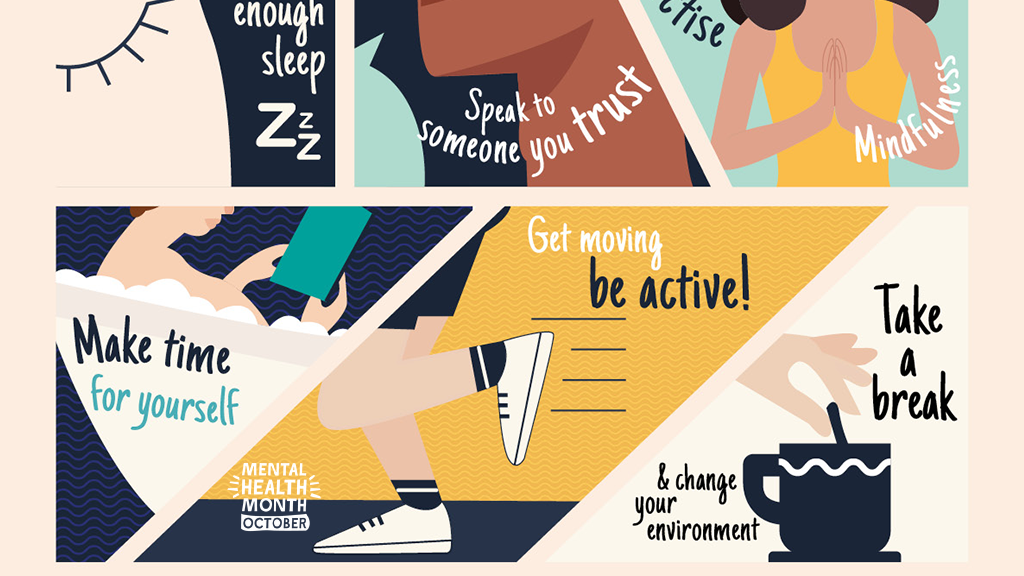Worried about end-of-unit assessments? This advice will help you cope
It’s Mental Health Month, and we’re focusing on managing feelings of stress and anxiety. The Trimester 2 end-of-unit assessment (EoUA) period runs from Monday 9 to Friday 20 October and, for many students, this can be a very stressful time. It’s normal to be anxious, feel pressure to achieve good marks, or worry about personal or family expectations.
Keep in mind we’re with you every step of the way! Check out what we’re doing this Mental Health Month to get inspired by great activities and resources that can help you bolster your mental health and wellbeing.
 If you struggle with nerves or anxiety around final assessments, check out the helpful advice from Deakin student counsellor Alison Lau (pictured) on coping with stress and accessing help. You can also check out more of Alison’s great stress management tips via our Instagram page and DeakinWELLBEING app.
If you struggle with nerves or anxiety around final assessments, check out the helpful advice from Deakin student counsellor Alison Lau (pictured) on coping with stress and accessing help. You can also check out more of Alison’s great stress management tips via our Instagram page and DeakinWELLBEING app.
And if you feel stressed by social situations, make sure you also listen to our new Managing Social Anxiety podcast, presented by our very own Deakin counsellors! This helpful resource can help you devise strategies to handle academic situations and interact effectively with your peers.
‘I’m feeling anxious about my assessments and results, but when does stress become something to worry about?’
Stress is a human reaction to difficult situations – whether you’re a professional athlete or student, we all need a level of performance stress to do our best. Stress indicates passion for achieving your goals.
But looking too far ahead and asking negative ‘what if’ questions can lead to worrying about worst-case scenarios. Stress manifests in physical forms – a change in appetite, constant headaches/stomach aches, muscle tension, fatigue and agitation. This kind of stress can lead to poor academic and lifestyle outcomes.
Be aware of your typical signs of stress and ask for help when they negatively impact your work, study, health or relationships. Act early.
‘I have a lot of demands placed on me – how can I look after my mental wellbeing?’
- Set achievable goals and reasonable expectations: Break up the day by assigning time for work, study and recuperation. Include time for sleeping (eight hours) and eating (three meals), as this provides the foundation for clear thinking, strong focus and energy.
- Prioritise: Develop a list of tasks and mark them on a calendar. This helps you visualise how much time you need to study and allows you to organise your time depending on each task’s urgency, importance and resources.
- Uni-task: While multi-tasking may feel more productive, it overwhelms your mind and increases your chances of making mistakes. Think about when you have too many browser tabs open – your brain can forget why some of them are even there. Focus on one task at a time to be most efficient!
- Work with, not against, yourself: Becoming frustrated or angry when you don’t meet your expectations or goals is a normal response, but try countering this negative self-talk. Treat yourself like you would a friend – be empathetic and understanding, and use your strengths to problem-solve!
‘I put pressure on myself to achieve high marks and my family has high expectations of me. How can I deal with this as I wait for my results?’
Being programmed your whole life to perform well means it’s natural to aim for high marks and want to meet family expectations. But if you worry about the outcome, and avoid contact with – or even lie to – your family, ask yourself: what’s the value in investing time and energy worrying about something you can’t change? While you wait, is there anything more you can do that will improve the outcome?
If your results are disappointing, be open and honest with your family. As well as reducing your worry and guilt, this could improve how well you understand each other and lead to better support systems.
‘I feel prepared academically but suffer from horrible nerves during the assessment – how can I stay calm and focused?’
The more you try to eliminate nerves, the stronger they get! They’re normal, so acknowledge their existence. Guard against worst-case scenarios of forgetting or failing and bring yourself back to the here and now: the assessment. Slow down thoughts with calm and even breathing, drink water if you’re sweating and breathe deeply if your heart is pounding. Then do your best!
‘I’d like to talk to someone at Deakin who understands what it’s like to be a student. What services do you offer?’
Read answers to student questions about stress and coping on Ask Counselling, or ask your own anonymous question. A counsellor will post a tailored response, often including resources and ways to manage stress and other emotional difficulties.
Book a free and confidential appointment with one of our student counsellors, who are trained to help you cope with challenges and overcome emotional difficulties. They understand what it’s like to be at uni and support students to manage their stress. First appointments are generally available within one to two weeks. If you’re based overseas, you can access local support.
Also check out the DeakinWELLBEING app, which includes interactive tools, videos and podcasts that can enhance relaxation, focus, energy, mood and productivity in minutes.
Best of luck with your assessments!

You must be logged in to post a comment.